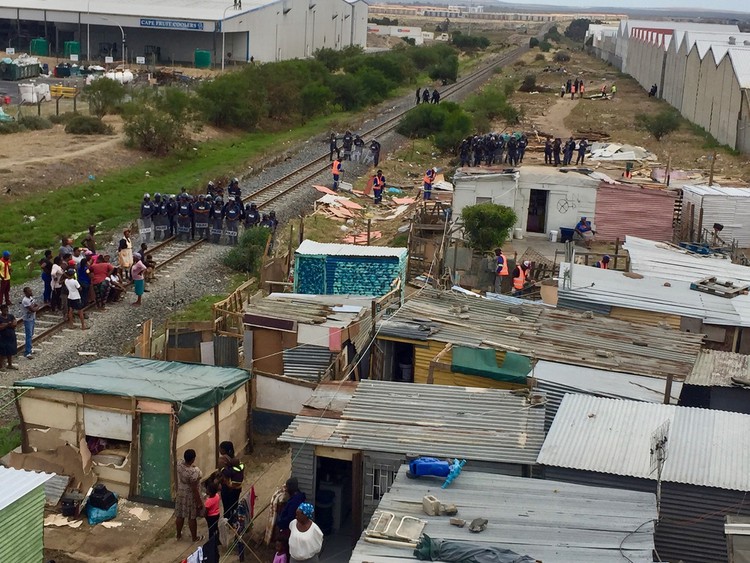
Riot police officers form a chain to prevent residents from accessing their homes as authorities demolish shacks in Dunoon near Milnerton on Thursday. Photo: Peter Luhanga
10 March 2018
Residents watched on Thursday as the City of Cape Town Anti-Land Invasion Unit (ALIU) tore down homes built on municipal land in Dunoon and across Potsdam Road (at the back of Killarney Industrial area) near the Transnet freight railway line.
A strong law enforcement presence including police officers wearing riot gear and bulletproof vests and carrying riot shields formed a chain to block residents. Police Nyalas lined Potsdam Road.
In protest, residents blockaded the N7 and Potsdam Roads with burning tyres and stoned vehicles, MyCiTi and Golden Arrow buses.
Earlier residents in Siyahlala informal settlement blockaded the railway line and stopped a Transnet freight train, saying it was now their home.
On Friday, GroundUp spoke to the protesters who agreed to speak on condition that they not be named. These residents said people had occupied the football ground at the back of Sophakama Primary School. Some were kicked out of the backyards of RDP houses after the owners sold their houses to property entrepreneurs who build on rooms for rent, asking R1,500 to R2,000 a month.
Other occupiers were from Siyahlala informal settlement near the railway line. They face eviction from their current homes by Transnet with no alternative land being provided.
Siyahlala residents started protest action early February, taking out their anger on MyCiTi bus stations.
On 3 March, the occupiers marked out plots with wooden planks and started erecting shacks on the football pitch. Four shacks were fully erected and then occupied. “People started fighting for plots. They said you can’t have a big plot to yourself, let’s share it. The arguments were heated. Threats were made against each other. There was vulgar language all over the place,” said one backyard dweller who had erected a shack.
On Thursday, ALIU officials removed all markings and pegs, and tore down the shacks.
Since then meetings have been held in the night. Backyarders have vowed to continue rebuilding on the football ground. Plans are being announced on social networking sites.
“We need land. We don’t want houses. We need land to build shacks. If we demand houses we are going to wait till we are old and frail. Some of us have been living in our parents’ back yards and they are kicking us out. They want to rent out the back yard space and make money so we need land,” said an occupier.
A mediation team comprising representatives of Siyahlala informal settlement, the City of Cape Town and Transnet Freight Rail, signed a Mediation Agreement in February 2018, said Mike Asefovitz a spokesman for Transnet.
“The mediation process started June 2013. Transnet initially approached the court for an eviction order in terms of the Prevention of Invasion and Eviction Act and the matter was referred to a mediation process by a judge, for an amicable resolution of dispute between Transnet, the Dunoon informal residents and the municipality officials,” said Asefovitz.
Asefovitz said: “Then an emerging development took place. New residents started erecting structures along the railway line much closer than the old ones … in complete violation of the new found accord.
“Transnet security reacted by removing incomplete and unoccupied new structures erected along the railway line but unfortunately people started resisting demolitions and the invasions continued in 2018 making the situation even more complicated to handle.”
Ward 104 councillor Lubabalo Makeleni (ANC) said residents told him that they do not want trains moving on the railway line until the residents form part of the relocations plans.
He said Transnet had paid for costs to flatten dunes near to the N7 to create space to accommodate 239 families included in the original Transnet eviction application. But after five years of mediation there were no longer just 239 families.
“I think people are opportunistic. As soon as they heard that there was a development that was going to take place in Siyahlala, they rushed and squeezed their shacks near the railway line so they can be part of the new development,” said Makeleni.
He said he was scared that conflict may flare up between the new land occupiers and the 239 families who he called the “rightful beneficiaries”.
“We have been engaging both sides but its difficult to deal with the new residents, They say this today and the next meeting they say something completely different,” he said.
He said the initial relocation of the 239 families was supposed to start in February 2018 after completion of the mediation process. “They have vowed that there will be no relocation that will take place if they are not part of it, and that there will be no trains using the railway line,” he said.
Asefovitz said after it was decided that the occupants in the danger zone would be relocated to the sand dune area, further occupations took place. Transnet successfully applied for a court interdict to stop any new structures being constructed. The interdict, he said, was communicated and notices were placed in the settlement informing people to stop putting up new structures. However, Transnet did not evict anyone.
“We went the route of engaging with the affected parties,” he said. He said Transnet had not been able to move trains in the area for over two weeks. “The impact is lost revenue and non-delivery to our customers,” he said.
The Tableview Police confirmed their presence in the area saying no one was arrested in Thursday’s protests. Police spokeswoman Captain Adriana Chandler said a case of public violence has been registered.